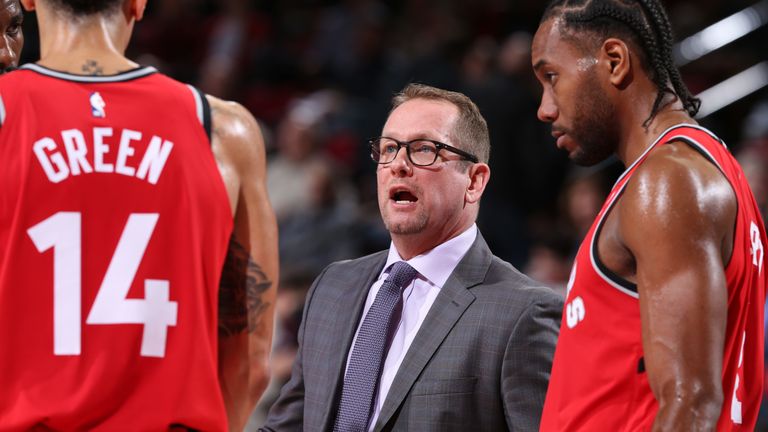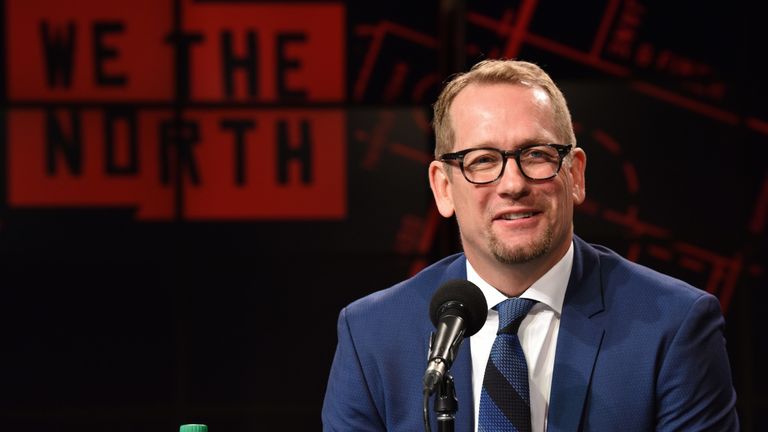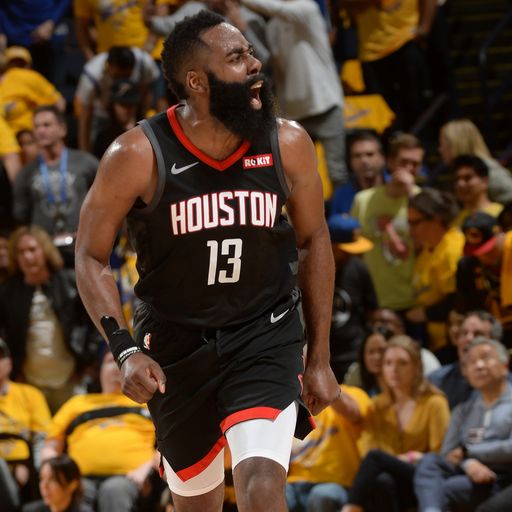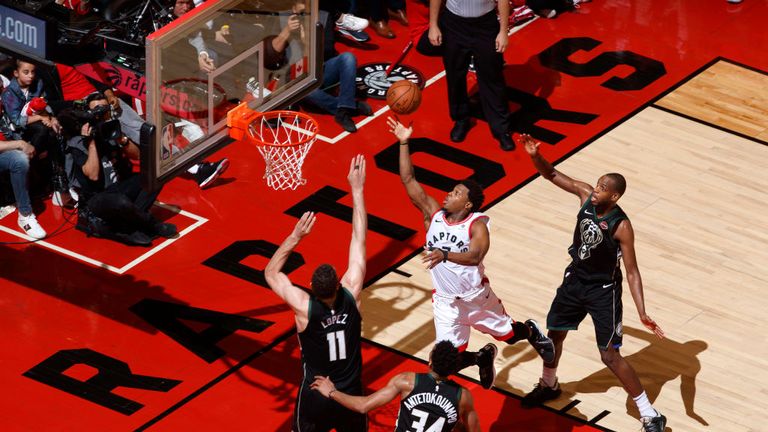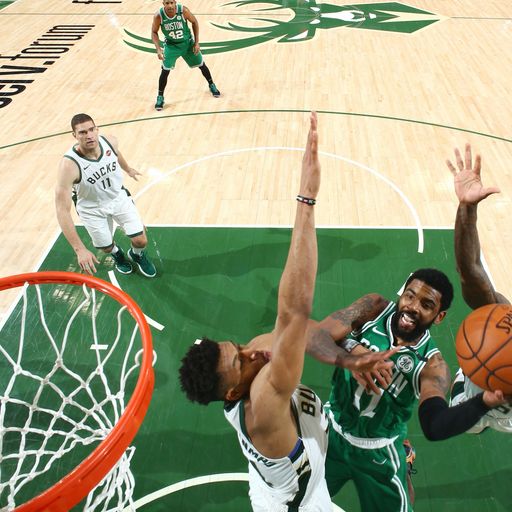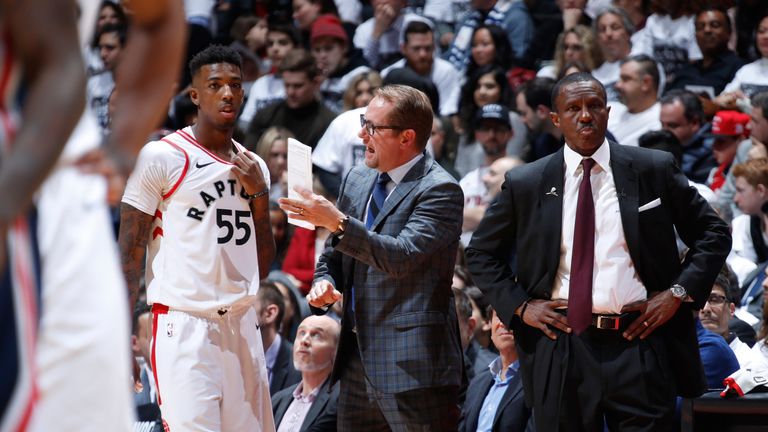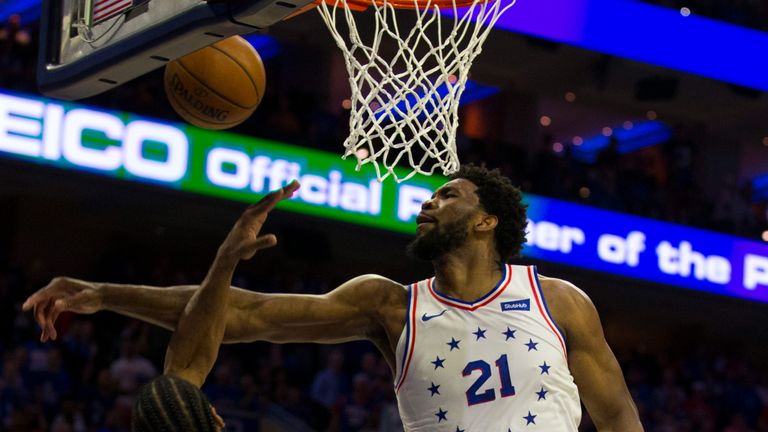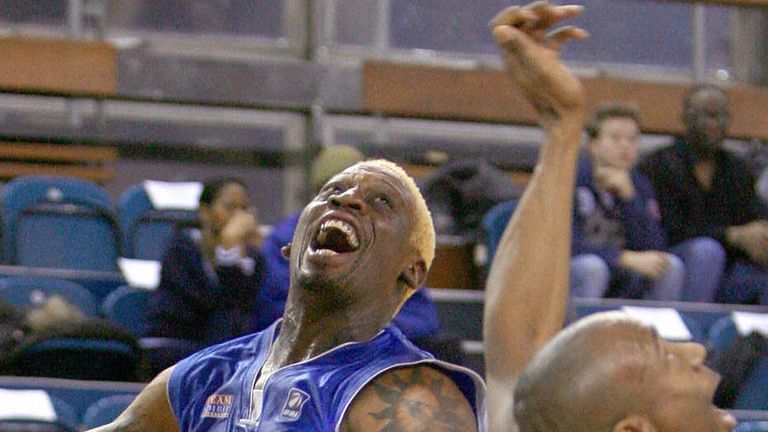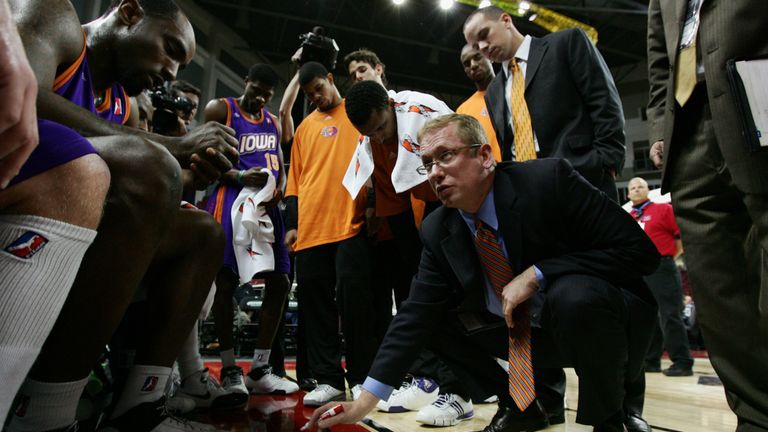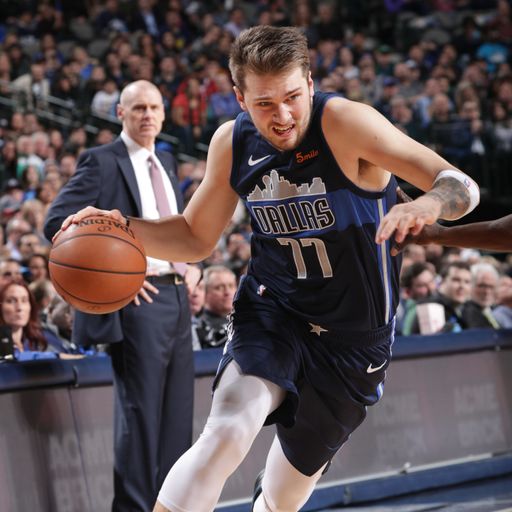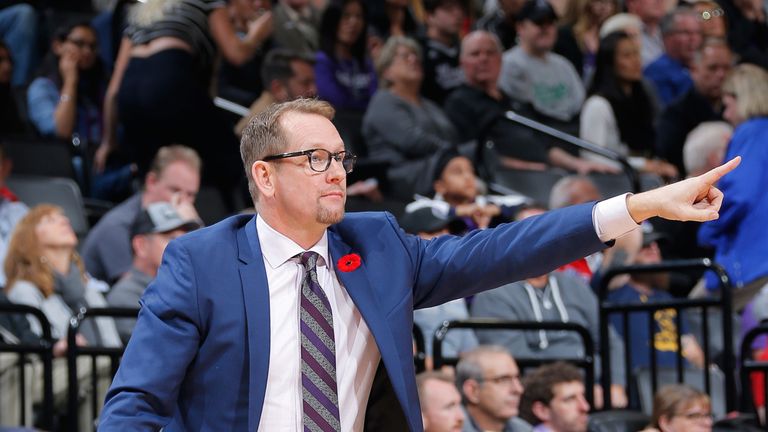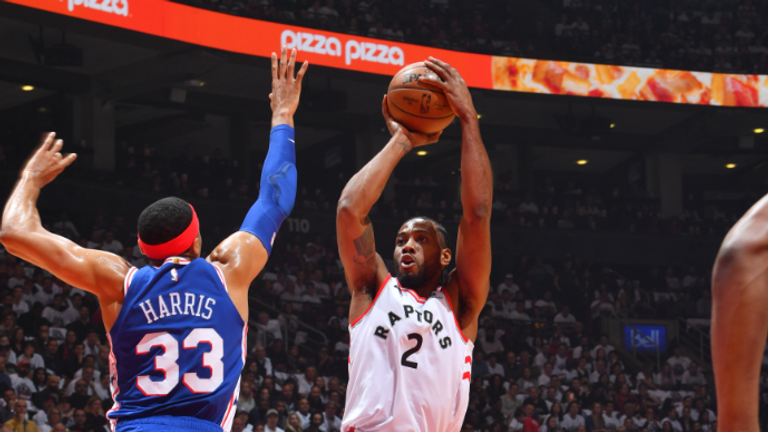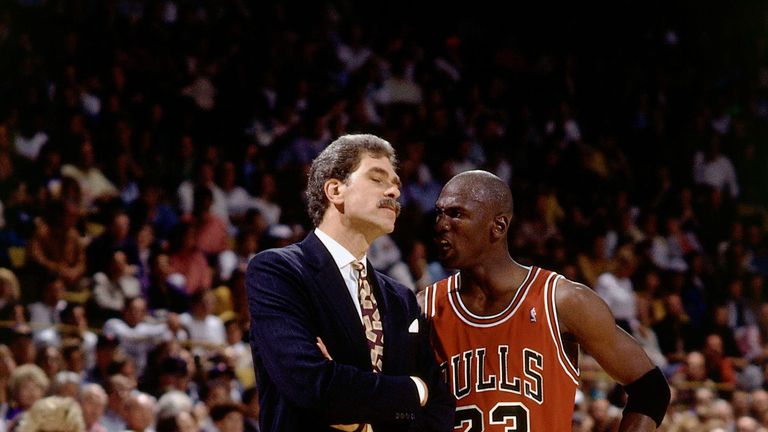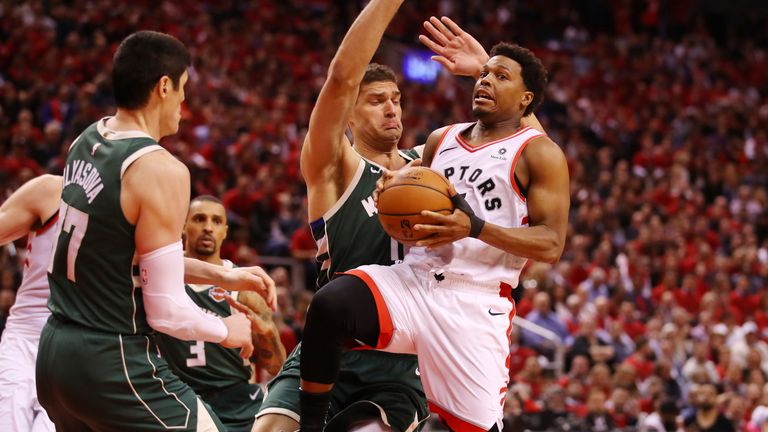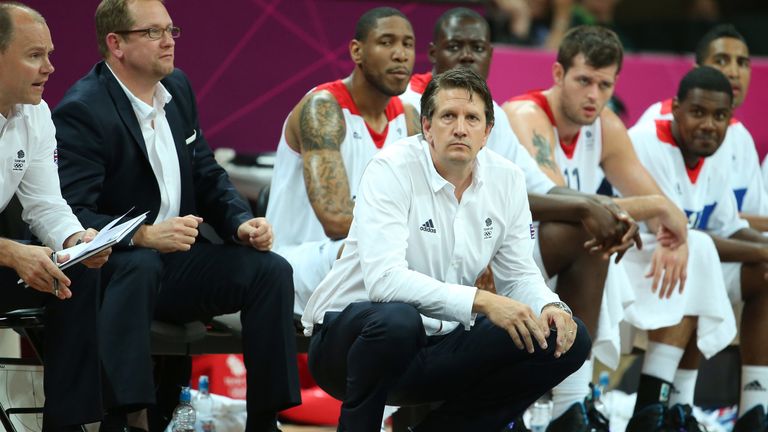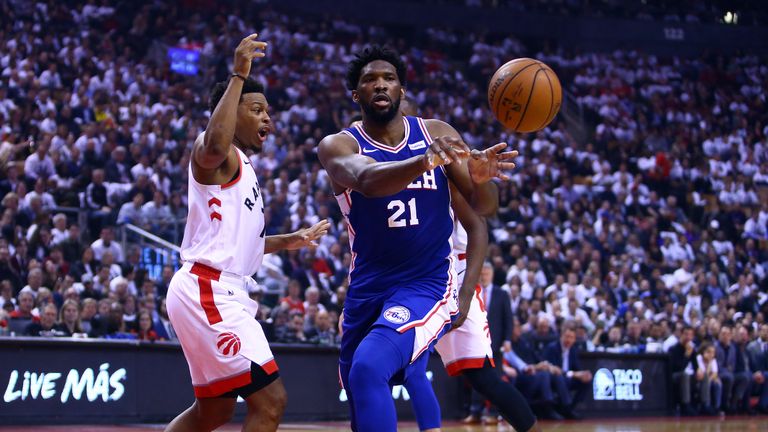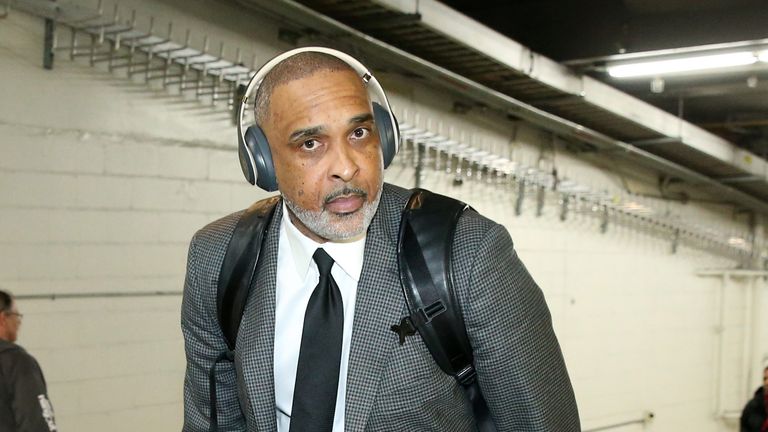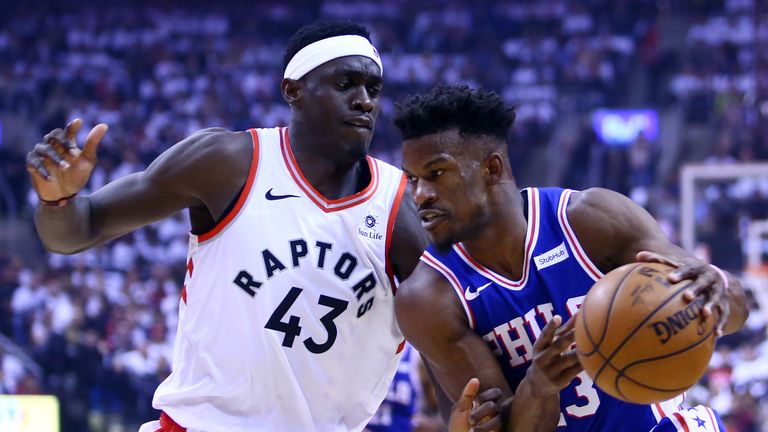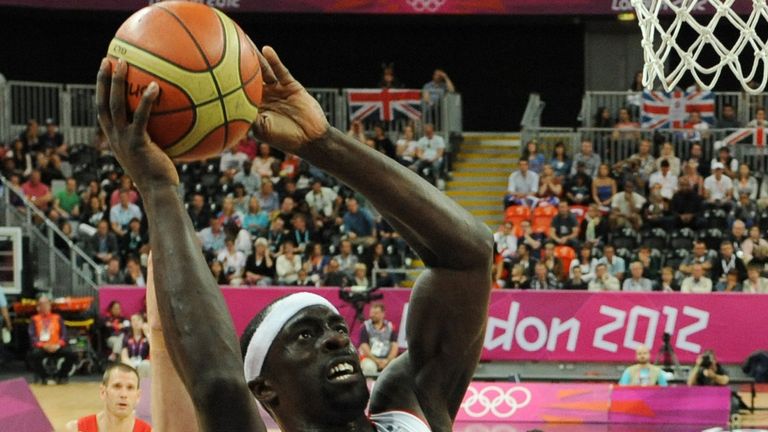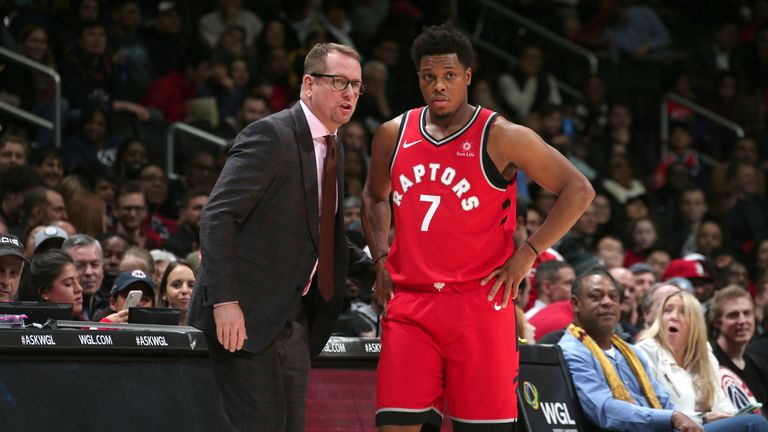Toronto Raptors head coach Nick Nurse's NBA journey has its roots in Britain
Watch Game 1 of the NBA Finals live on Sky Sports Arena in the early hours of Friday morning (2am)
Wednesday 30 October 2019 16:16, UK
Head coach Nick Nurse is hoping to lead the Toronto Raptors to victory in the NBA Finals this year but his basketball coaching journey has its roots in Britain. Max Whittle tracks Nurse's route from Iowa to the BBL and on to the NBA.
Toronto Raptors shooting guard Danny Green looks on in astonishment the moment he finds out that his current head coach, Nick Nurse, once plied his trade in a nation obsessed by soccer, not basketball.
"I need to do more background checks on my coach", he laughs.
Surprise is a common response when people are told that Nurse, who is in his first head coaching role in the NBA this season, spent over a decade coaching in England. Having been an assistant coach with the Raptors the previous five seasons, the majority of his staff are familiar with his methods. But not many of them know about his coaching roots.
"Where is he?", Raptors assistant Phil Handy asks at shootaround. After Kawhi Leonard and Pascal Siakam walk by, Handy sees the man in question, walking across the sideline with sneakers on and a smile to welcome the morning media. "Nurse", he says with humorous force.
Trending
- PL Predictions: Forest to turn up heat on stubborn Ange
- Transfer Centre LIVE! Bayern want Dortmund's English winger Gittens
- Man City latest - Pep: City chair supports me 'incredibly'
- Liverpool latest: Slot says it's 'so hard' to win a league
- Littler targets nine-dart history: 'It's becoming a frustration'
- Kelce breaks record as Chiefs beat Steelers to clinch No 1 seed
- Amorim: Man Utd are maybe in one of their lowest moments
- Is this the man to dethrone Usyk? 'He would knock him out!'
- How does a 'different' Arsenal cope without Saka?
- Man Utd latest: Dalot spends Christmas Eve helping homeless
This is not the first time Handy has worked for him. 18 years ago, Nurse coached Handy to a league championship in Manchester, a city that typically reserves its trophies for those kicking a ball around in red or blue.
"It feels like old times", Handy says. "Everybody else kind of looks at him weird and I am just like, 'yeah, that is Nick'".
The tendencies and behaviour Handy refers to all began overseas. Nurse arrived as a player-coach for the Derby Bucks of the British Basketball League in 1990, sporting a crew-cut that had blossomed as a graduate assistant at his alma mater, Northern Iowa, the previous year. The BBL had only been in existence for three seasons, less time than Nurse had run the point in college, but he would grow alongside the division, leading four other British teams over an 11-year span. It was a period of obstacles and opportunities that prepared Nurse - not that anybody knew it - to become an NBA head coach, and was "a lesson in how not to be pampered", former Bucks owner Tim Rudge says.
The difficulty of landing any job in the NBA is enormous, hence Green's puzzled look in learning that Nurse's coaching apprenticeship was in a country known for soccer first and pastimes such as cricket and rugby second. What Green and others probably guessed is, it was never part of the plan.
Iowa to Derby via Germany, Australia and Japan
Every year during the Christmas period, two letters are posted between cities that have likely never connected before. The delivery begins in Derby, England and ends in Carroll, Iowa and is the means by which Chris Squires and Bill Baddeley maintain a friendship they have shared since meeting at a basketball tournament in Holland in the early 90's. The distance between them is sizeable, but so too is their loyalty to each other, and that began because of basketball. They have been equally faithful to the sport, and it has rewarded them in many ways. Most significantly, they happen to be two of the central characters that landed Nurse his first professional coaching role in England almost 30 years ago. As Baddeley says, "sport shrinks the world".
About the time Nurse was transitioning into coaching at Northern Iowa, an annual under-20 basketball tournament was taking place in Rijen, Holland. Squires, who has a long association with Derby and currently tutors younger players, was leading England in the eight-team competition while Baddeley - who coaches and teaches at Carroll Community High School in Iowa - took charge of a USA squad that consisted of college rookies and sophomores. It was here the pair first met and in no time they were spending their non-working hours inside a cafe next to the playing courts, chatting away as only hoops purists can. Seven days later, they said their goodbyes and figured to connect again.
Baddeley was back in his office in Iowa for the start of another school year when he received a phone call from Squires, who offered him the newly vacant job as Derby Bucks head coach. "I needed a few days to get my head screwed on after that", Baddeley says, who would be required to go to Derby and interview for the role.
Baddeley was, like Nurse, born in Carroll, a midwest city in the state of Iowa with a population of 10,000. He used to run day camps that Nurse attended as a teenager, earning him the nickname 'Big Bad Bill Baddeley' as the pair became good friends. They remain in touch, despite Baddeley's allegiance to the Raptors' Eastern Conference rival Boston Celtics. Having established a life in Carroll, Baddeley decided that it would not be fair to transport his family overseas and he turned the Derby offer down.
In the years leading up to this, Baddeley had marvelled from the bleachers over Nurse's play in high school, describing him as a 'true point guard' because he never turned the ball over and was an excellent distributor.
"I told Chris, 'you should make contact with a guy I know called Nick Nurse. He is just out of college and might entertain the idea'".
Nurse was none the wiser. He had decided not to carry on with the profession in which he had majored - accountancy - and midway through his first season as a graduate assistant received an offer to play for a team in Brazil. His coach told him to go for it, so he trained ferociously in order to get back into playing condition. Two weeks passed, then four, and at the same time Nurse's fitness was hitting peak levels, the offer evaporated into thin air. Nurse was in the best shape of his life, so in true pre-internet days he sent out an information pack to several clubs that he had remote contact with in the hope of landing on a roster. Nurse's CV reached corners of Germany, Australia, Japan and a small club in England called the Derby Bucks. He was desperate to play.
"Nothing was really shaking", Nurse says, so instead of traversing the globe he made the shorter trip to Iowa City, his plan being to join the University of Iowa coaching staff and start graduate school. Days before term started, he received an offer from a club in Bonn, Germany to be their starting point guard. That same day, Bucks owner Tim Rudge was on the phone, offering three times less money but a chance to play and, crucially, coach.
The conversation between Squires and Baddeley had prompted Rudge to rummage through the mail, and he re-discovered Nurse's forms. His cover letter began: 'Interested in playing and/or coaching overseas'. Rudge read back the opening sentence to Nurse on the phone and asked, "how about doing both?'".
Three days later Nurse was on a plane to London, and two days after that he was in a jet-lag haze playing in a preseason encounter against local rivals Leicester in the Midlands Cup.
"I really did not know what to expect", Nurse says from his office in Toronto, "but I ended up cutting my teeth in that league and a lot of what I developed there is what I use now."
'I'm not ready for this'
When news about the job arrived, Nurse called his former high school coach, Wayne Chandlee, who often pushed Nurse and his fellow guards not to shoot three-pointers, a philosophy the Raptors coach absolutely did not take to the UK. Nurse sought advice, from one of his former college coaches Eldon Miller too, and read as many coaching manuals as he could get his hands on.
"It was that weird feeling of, 'I do not know what I am doing, I am not ready for this'", Nurse says with a chuckle.
Nurse was connecting flights at O'Hare International Airport in Chicago when he first met Ernest Lee, known in many circles as one of the greatest players to never make the NBA. At least for the next year, he would be Nurse's backcourt mate in Derby and as Lee cast an eye over his new coach and team-mate, he whispered to his girlfriend, 'boy, he is really young'. Nurse was 21. Derby's elder statesman was a player named Terry Magnum, who was 35 at the time. This was challenge number one, and Nurse would have to adapt in an environment that was the complete opposite of what he was accustomed to. "They do not eat Yorkshire pudding on Sunday in Iowa", Nurse says.
For the first couple of days in England, Nurse had to temporarily lodge with the Bucks' secretary Martin Shaw and his son Matt because the house he was set to share with other members of the team was not ready. He still remembers the eventual street address: 58 Crewton Way. By the end of the season he could not shake the habit of crashing with the Shaw's. "He wanted to go and watch the Finals weekend in London so he could network and mingle", the younger Shaw says, "but he did not want to pay for a room so he stayed on our hotel floor".
Nurse hustled hard and chased every opportunity. This was at the tail end of a year in which he had absorbed everything he could about the British game, running his second-hand car into the ground scouting every team up and down the country. He wanted to learn. He needed to learn. The Bucks could only afford to pay half of their players and just eight of them showed up for the team's first practice. "Nick was shocked when he saw that our court at Moorways Sports Centre was tiled, not spring-loaded wood", former teammate Tim Lascelles says.
Financial limitations meant there were only two formal practices a week, on Tuesdays and Fridays. No matter. With all of that free time, Nurse used to go to Shaftesbury Centre, a leisure facility next to the Derby soccer ground. He would pay 80 pence to use a side basket on one of the walls.
"Killer", Nurse jokes. "That 80p used to hurt me." He first had to grab a pole from the store cupboard so that he could pull the basket off the wall, settling in for a couple hours of shooting practice.
"He certainly was not going to spend his time sightseeing", Rudge says, who took note of Nurse's eagerness to be great.
As was the norm for a young league finding its way, Nurse would find himself talking to a club sponsor while lay-up lines went on behind him before games. A lot of what he did was geared toward ticket sales and media exposure and, unlike the NBA today where there are entire public relations departments, the BBL didn't even have individuals doing this job.
Nurse did as much as he could to showcase the team and if his methods were successful, it would in turn elevate his experience. He coached clinics in the city and gave opinion on pathway development programmes. "The knowledge that Nick would have gained coaching here would have been vastly superior in certain areas to anything that the NBA could offer", Vince Macaulay, chief executive of the London Lions, says.
But while plenty of extra-curricular activity was forced upon him, Nurse attacked it with equal gusto. Casting his eyes over the Bucks' match-day programme for the first time, he suggested that the club alter the design. From that day forward, fans that opened the stats-filled booklet were greeted with a poster-size reading experience.
Most events, though, were not so controllable. Unwanted problems ranged from non-paid players not turning up for practice after a bad day at work, or the quirky Lee deciding he was going to shoot with his weaker left hand for an entire session. Whatever it was, Lascelles says he "never ever heard Nick moan about anything." He was instead sculpting his coaching philosophy while a competitive instinct to dominate as a player still chipped away in his mind. His players recall Nurse being convinced he was the best shooter in the gym, at all times.
Mike Finger, Nurse's roommate in college, was brought along to be his bench assistant coach. "I just gave him two simple instructions", Nurse says. "Do not ever take me out and give me the green light."
On that basis alone, Finger was a success.
Nurse spent one season at Derby before turning to coaching full-time. Along with stops back in the US and Belgium, Nurse toured the UK until he left the Brighton Bears, a club on the south coast of England, in 2006. "His world changed in Brighton", Rudge says, who helped Nurse apply the club's business strategy there. He describes Nurse's multiple roles in Brighton as being like the "head cook and bottle washer".
There were times when Nurse, coach and owner of the Bears, literally ran out of money, but his willingness to try everything - convincing Dennis Rodman to suit up for the team was one highlight - created a perfect breeding ground for future success in the G-League and beyond.
"Looking back, I was really searching for my coaching identity", Nurse says. "The reason I went over there and stayed was because I was trying to work at my craft."
'Nick wants to win more than anything'
Nick Nurse was four years old, a cap perched atop his head as he looked out across the low cut grass from the Kuemper Catholic High School baseball dugout. The future coach had been fast-tracked to bat boy duty. "Nick had that look", Dennis O'Grady says, who has known the Nurse family since moving to the town in 1971 to be sports editor of the Carroll Times Daily Herald. "You could tell then that he was a gym rat".
Surrounded by five older brothers and three sisters, Nurse's childhood was a showcase in sporting excellence, particularly from brothers Jim, Dan and Ken. "Nick being the baby, he was going to be a good athlete", O'Grady says. In 1984, Kuemper High School qualified for the state football playoffs for the first time, with Nurse at quarterback. The following spring, Nurse was the point guard on the basketball team that won the school's only state championship. He also played shortstop and pitched for the baseball team, and threw a curveball for his fourth choice. "He was a very good pole-vaulter", Baddeley says, who witnessed Nurse fly in the range of 13 feet one afternoon.
Shortly after Nurse graduated from high school, the state dropped pole-vaulting competition because of safety risks, leaving him with the school record to this day.
"He does look like a quarterback", Green says of his current coach. "He is always interacting with coaches from different sports, trying to get their advice on certain things. He is very open-minded to learning about different strategies and different people and how they operate, and that comes from playing multiple sports. Pole-vaulting for sure is different".
Nurse was named Male Athlete of the Year in the state of Iowa in 1985, voted for by The Des Moines Register. He went on to university and graduated Northern Iowa as their all-time leader in three-point percentage - 46.8 per cent - another clip that remains alone in first place.
"I was feisty and I did not back down much", Nurse says. With all of that whirling around in his DNA, Nurse's BBL debut left quite the impression on local supporters. An American player coming to the UK has always been a big deal, but particularly back in 1990. In his first game, Nurse pulled down former Syracuse star Gene Waldron's shorts as the two got into a scrape over a loose ball, despite it being a 'friendly' preseason encounter. Nurse remembers the coming together but says the event was "probably wildly exaggerated." One version from a former team employee includes the detail that Waldron was so mad he chased Nurse into the car park outside.
Whatever happened that night, there is one common truth. "Nick wants to win more than anything", Nigel Lloyd says, who played for Nurse with the Birmingham Bullets in the mid-nineties, his second stop on the UK coaching ladder beginning in 1995. "If he can change winning today then he will not talk about it tomorrow".
Being that good of a player - and young - went a long way towards creating the intended culture, and established Nurse's player-friendly coaching style in those early years.
"At the end of practice, Nick used to put down a £10 note on the free throw line", Clive Allen says, a team-mate of Lloyd's in Birmingham. "He called it 'money in the bank'. Your shot had to be a swish and if you missed, you were out. Nine times out of 10, Nick won". Nurse would often shoot the ball from half-court at the end of sessions - "and always bloody make it", Allen says - and when coaching the Manchester Giants between 1998 and 2000 had every player put a pound coin in the middle of the court with the winner of a three-point competition landing the entire pot.
"He was keeping his money and walking home with ours", Allen laughs.
Nurse wanted to set the only example he would tolerate from his players. "We would run sprints and I would try and win them", he says.
"Nick probably is not going to challenge us to shooting competitions knowing that we have some pretty decent shooters on this team", Green says of today's Raptors, "but every day he is on top of us, making sure we are handling our business the right way and building great habits. He reiterates and repeats the things that we need to get better at."
While nobody could imagine Nurse running up and down the floor with the likes of Kawhi Leonard and Kyle Lowry, he often had to train with his English teams because players worked overtime at their day jobs or picked up lasting injuries. Ronnie Baker, a household BBL name who was ironically on that select team with Squires in Holland, played for Nurse with the Giants, London Towers and Bears, and had faced him years earlier when Nurse was at Derby and Baker the Brixton Topcats. "He would defend me in practice and say stuff like, 'Roy, you can't guard me'", Baker says. "He never lost it, and he was doing it to give us an edge".
There was one player, however, that Nurse could never overcome. "I still say to this day, I could not guard Nigel Lloyd", a former player of his who is second all-time on the BBL scoring list.
Taking the ups and downs in stride, Nurse's education continued. He explored the balancing act between building close relationships with his players and pushing them hard. He changed the culture of a common British basketball setup, implementing advanced scouting, punishing practices that included a one-on-one box out drill that would not finish until everyone had collected three rebounds and scored the same amount of baskets, and an up-tempo offense which evolved from tough-nosed defense. "He was 20 years ahead of his time", Baker says, who ran Nurse's revolutionary-at-the-time triangle offense one year and a full-court press for entire games the next.
"I was in love with the triangle because it was so different to what everybody was doing in the NBA", Nurse says. "Everybody else was dribbling down, throwing it into the low post and then their guy would go to work. To me it was boring."
The triangle has all but died in the modern game, but Nurse was once in awe of the crisp cutting and spacing, an offensive system mastered by Michael Jordan's '90's Chicago Bulls under Phil Jackson. "It was beautiful to watch", he says. Nurse also took scouting very seriously and knew exactly what he wanted in an individual. He once decided on an Australian player for the Bullets because he witnessed him getting into a fight over a foul during an All-Star game, unable to pass up that level of competitive spirit.
During the four years between leaving Derby and arriving in Birmingham, Nurse coached at Grand View University and the University of South Dakota. During his time there he called Rudge to tell him he had spotted a handful of Americans who were not likely to get picked up by British teams but had potential.
When Nurse returned to the UK he and Rudge acted as agents, bringing the players over and driving them around in a hired minibus to as many scouts as possible. "It was like herding cats until they got on the basketball court", Rudge remembers. One of the players in the travelling party was a young man named Fabulous Flournoy, who started his career with Nurse in Birmingham and is still, at 45, a player coach for the Newcastle Eagles and arguably the most famous name in British basketball history.
"Fab was the guy that never gave up", Allen says. "Heart as big as a lion, and Nick saw that as a reflection of himself". As recently as three summers ago, Nurse worked out with Flournoy in Las Vegas when his former player wanted help with his shot.
Within five years of Nurse's arrival in England he, Chris Finch - now an assistant with the New Orleans Pelicans - and Bob Donewald, who was LeBron James' personal coach during his rookie year in Cleveland - were all playing or coaching in the BBL. It was a watershed moment for the British game.
Fast forward to the 2012 Olympic Games in London and Finch was the head coach for Team GB and Nurse his assistant. They crossed paths with Donewald, who was coaching the Chinese national team.
"Those three coming in when they did, they changed the way we in Britain play the game", Macaulay says, while Lloyd simplifies it by saying, "Nick loves defense, but he likes scoring more."
Britain had quickly become Nurse's laboratory for mastering the art of coaching, and he knew it would be the grounding that saw him well in the future.
'He puts you in position to flourish'
Clive Allen had run over at work and was 25 minutes late for practice, so he knew what was coming.
Nurse had implemented a fine system in Birmingham where for every minute a player was late, they had to surrender a pound. It was the latest currency-related scheme Nurse had drawn up, and Allen owed 25 big ones.
"I was so annoyed that I started paying him in pennies. Nick just looked at me and gave them back."
But it never ended sour. Nurse had some friends at a local restaurant called Casa Italia, located on Hagley Road, and at the end of each month he pooled all of the fine money and took his players out for dinner.
"Things like that brought us all together", Allen says.
A similar gesture took place after he became head coach of the Raptors last summer. Nurse was in Las Vegas for Summer League and took the entire staff to a team dinner, followed by a viewing of the Michael Jackson 'One' show at Mandalay Bay. "Just bang, on his own, and that was cool", Alex McKechnie says, who grew up in Glasgow and is now the Raptors Director of Sports Science. "Once you understand the science, you become an artist, and Nick is there. He has a massive, massive upside."
The promo on that Vegas evening described Jackson as 'The King of Pop, The Genius, The Visionary, The ONE'. Nurse is often described as an offensive genius, "because he puts you in position to flourish", Lloyd says. "Nick has this charisma about him", Allen says. "He is a player's coach."
One evening, Nurse arrived at a Bullets practice with a box of blue and white t-shirts. Tired of his players coming in with different gear on, he instructed his team to wear them on alternate training days. On the back were the words 'Hanto Yo', a Native American war cry that means 'We Go To War Together', or 'Clear The Way'. He masterminded a similar tactic in Belgium in 1998, his Oostende players wearing the slogan 'OPAAT', which stood for 'One Possession At A Time'.
"We all had t-shirts!", Raptors assistant Handy says, giggling at his favourite Manchester memory. "I had this thing where whenever we were on the road, when I made a free throw or hit a three, just to quiet the crowd I would always be like, 'shhhh'". Handy places his finger on top of his lips to show off his signature move. "Nick had t-shirts made for me with that caption on it. Everybody had one. I actually still have mine somewhere in my closet."
The souvenirs were so good, in fact, that Lloyd still owns the original shooting manual that Nurse gave to all of his players in Birmingham.
"It was called the Nick Nurse Black Book of Shooting", Lloyd says. Inside were technique breakdowns, drills and space in the back for players to write down their scores and thus create the competitive environment Nurse craved. "We kept score everyday", Lloyd says, while all players were typically asked to shoot before stretching at practices.
Over two decades later, Lloyd and Allen have both photocopied the black book numerous times for their own players as they made the move into coaching, in Lloyd's case handing them out to the Barbados junior national team. Tomas Van Den Spiegel, who won two Euro League titles with CSKA Moscow during his career, played for Nurse in Oostende when he was just 20. Nurse immediately challenged him to see how far the youngster would go for the team. "He was always in my head. He had me running laps, but he would run them with me". Nurse handed over Rick Pitino's book, 'Success Is A Choice', "which I re-read over and over during my career.
"I still cherish it to this day. Maybe I should have it signed now that he has come such a long way".
Nurse's players maintain that he was that rare coach who put on great practices but also knew how to scheme for every opponent during a game, reacting a step or two faster than the opposing coach. He diagrammed and tested his coaching philosophies throughout the BBL season and readjusted them during the summer months in the US, where in 2001 and 2005 he coached the Oklahoma Storm of the USBL. He would often bring back things he had picked up.
"One day, Nick tells us we are going to meditate", Baker says. "He explained to us about the Zen and Phil Jackson and then we started humming. Everyone was thinking, 'what are we doing?', but then we realised Nick would try anything in order to win".
For the Raptors of today, that means being awarded WWE-style belts if players win group or individual competitions at practice. Whether or not his players were on another level mentally and spiritually after the meditation, the Giants did indeed win a title that season, Nurse's last in Manchester. "After the championship game, all of us were together for dinner and the owners told us we were receiving an extra bonus", Handy says. "Everybody was like 'ok, ok'. But at the end of that sentence came, 'but we have sold the team'". Only in the BBL.
'Nurse has had an impact on the British game that most fans could not even imagine'
Nurse was almost living the life of a detective, working on a secret mission in a country that took little notice of a sport he was trying to master.
"When I came back to England after my stint with Derby in 1995, I really wanted more time to study coaching", Nurse says. In order to do that, he set up his bunker at what is now a Hilton Hotel in Bromsgrove, just off the M5 that runs through the West Midlands. There was no internet and certainly no basketball being shown on television, but Nurse stumbled across a company in Germany called Pontel, who specialise in distributing VHS tapes of NBA games around the world. Customers could only pick one team, so Nurse chose the Bulls in order to study the triangle offense. Every Friday he would receive three videos in the mail.
"I was starving for basketball and would watch them 100 times", Nurse says. He would sit down with his players in the middle of the night and, watching one of the greatest teams ever assembled, the group decided they were going to try and emulate them in practices and games.
"To be honest, we did not run it very well, but at least we had a system that we believed in and the players thought was fun."
Pontel still exists 23 years later, but the guess is Nurse will not be needing such a service in Toronto. Even so, those hotel rooms were where he became an attentive basketball student. Nurse wanted to improve the skills of his roster, in the process gaining an advantage on every opponent he faced.
"He could be teaching French and he would find a way to make it simple", Pops Mensah-Bonsu says, who played for Nurse during his entire stint with Team GB.
Londoner Mensah-Bonsu, who played for five NBA teams including the Raptors, was 13 when he watched his first professional game of basketball. His youth coach, Joe White, took him to see the Hackney Towers at Wembley Arena, where Mensah-Bonsu played for the junior team. His overwhelming thought at the time was, 'how can I play in the BBL?' It just so happens that in that very game he was watching, Nurse was playing and coaching for the Bucks. 20 years later, Nurse coached Mensah-Bonsu at the London Olympics.
"Nick Nurse has had an impact on the British game that most fans could not even imagine", Mensah-Bonsu says.
It wouldn't be Nurse without some of that impact coming slightly out of left field, for example having Dennis Rodman play three league games for the Bears back in 2006.
"I do not recall him [Rodman] saying anything to any of us", Baker says of that time. The former NBA star did not share changing rooms with the team, joined his new team-mates during the warm-up, finished in double digits in rebounding before leaving without a word. "It was bizarre", Baker says.
Nurse came up with quirky ideas while running a team that regularly faced financial pressure. In the midst of all of that, he won coach of the year in 2004. "How do you do that?", Rudge asks.
Good question.
"It was a quasi-autocratic approach", Nurse says. "Somebody has to be leading the team, but you need to transfer some of that ownership to the players and get their ideas. How was I developing chemistry? How was I motivating guys to play better than they had ever played before? How was I motivating them to play more team basketball?"
Nurse had to work with lesser talent, blend player disparities on the floor and find a way to make it a success.
"I gave them this little spiel about having to come to the arena expecting to win. We had to change their mindset. I guess it kind of sunk in."
That is an understatement. "We just felt if we did what Nick told us to do, teams were not going to beat us", Allen says.
Nurse is now attempting to do the same thing but at the highest level, tasked with elevating his Raptors squad to their first ever NBA Finals.
They have been one of the best teams in the league all season - both in performance and record - and their head coach is teaching many elements that were created or inspired by his time in England. Moorways Sports Centre has become Scotiabank Arena, and inside the Raptors' home works one more witness to this far-fetched story. During Nurse's final season with Birmingham in 1997, current Raptors president Masai Ujiri - the man ultimately responsible for hiring a coach - played against Nurse. He suited up for Derby.
The Raptors have more British influence than even they might know. So much, in fact, that it almost feels like it was part of the plan after all.
